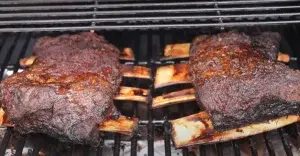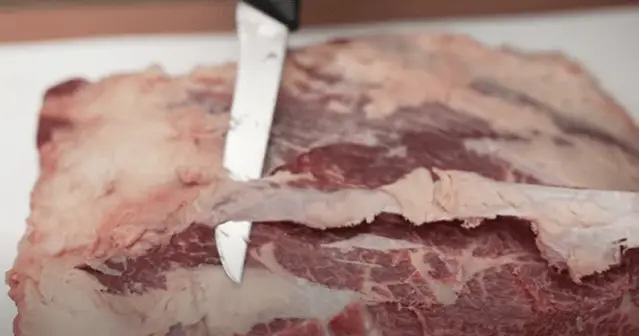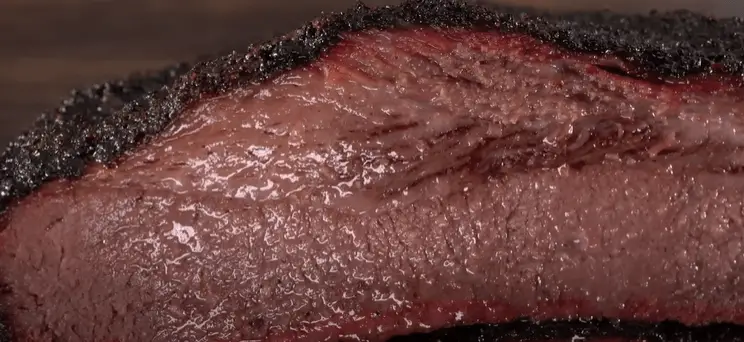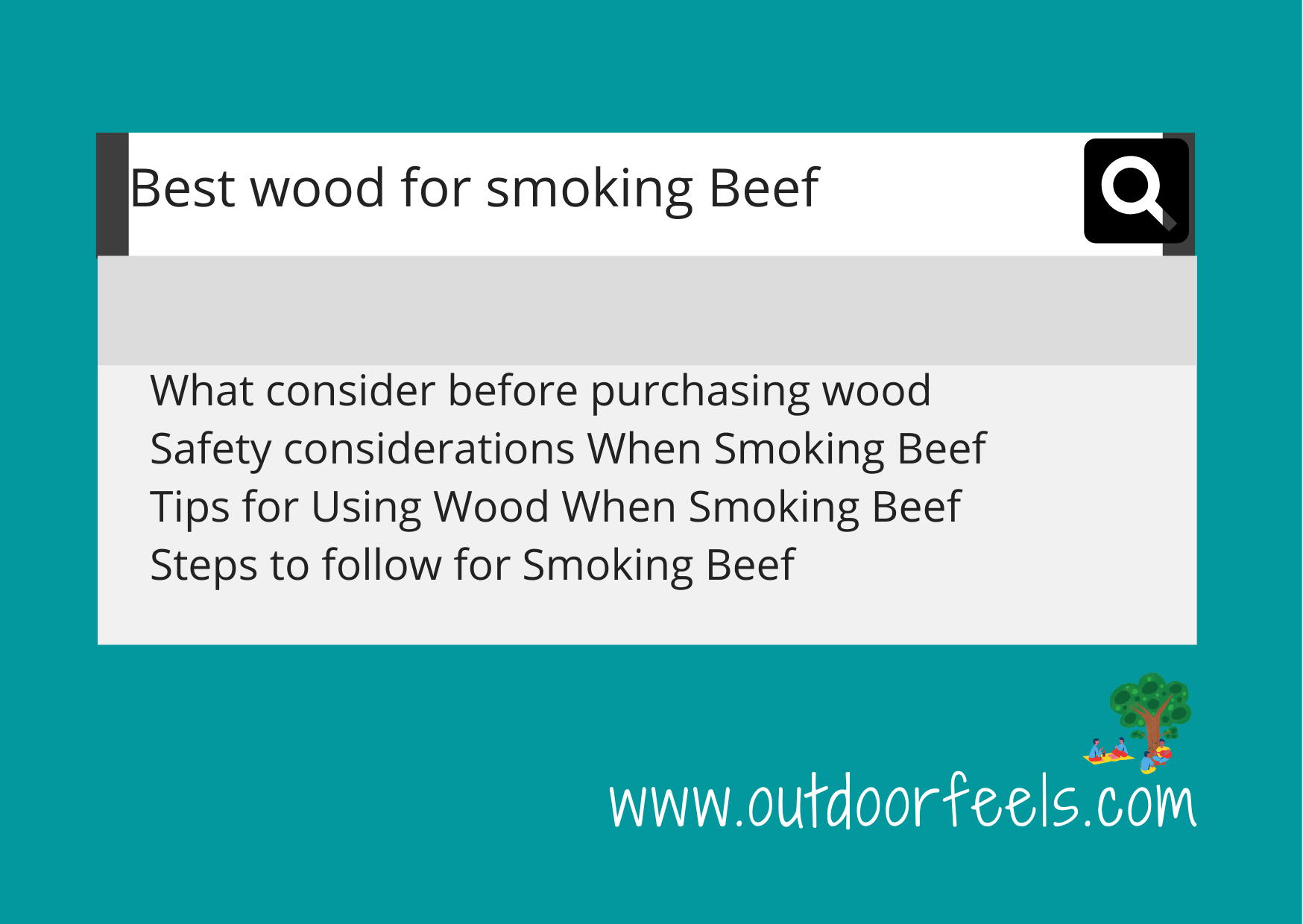Calling all meat lovers! If you’re anything like me, you know that the key to an unforgettable beef barbecue lies in the choice of wood..
From adding subtle hints of sweetness to infusing rich smoky notes, different wood types can work wonders on your favorite cuts.
So, let’s dive into the delicious world of wood-smoked beef together.
Discover my top picks for the best wood varieties that will make your taste buds sing with joy…;

- # Here are the Top Wood options that are widely regarded as the Best for Smoking Beef:
- 1. Oak
- 2. Hickory
- 3. Mesquite
- 4. Pecan
- 5. Fruitwood (Cherry, apple)
- # What should I consider before purchasing Wood for Smoking Beef?
- # Tips for Using Wood When Smoking Beef.
- # Safety considerations When Smoking Beef.
- # What are the steps to follow for Smoking Beef effectively?
- # Frequently Asked Questions:
Recommended Reading:
– Best wood for smoking fish
– Best wood choices for smoking pork
– Best wood for smoking brisket
– Best wood for smoked salmon
– Best wood for smoking turkey
– What are the Best wood chips for smoking
– Best wood for smoking meat
– Top wood to smoke chicken
– Top What are the best wood pellets for smoking
– Top wood for smoking lamb
– Wood for Smoking Ribs
– Best Wood for Smoking Pork
# Here are the Top Wood options that are widely regarded as the Best for Smoking Beef:
1. Oak
Oak is a traditional and dependable option for smoking beef, known for its strong and meaty flavor that complements the richness of the meat.
It is a versatile choice that works well with various beef cuts, including brisket, ribs, and steaks..
2. Hickory
Hickory wood is renowned for its strong and bold flavor, making it a popular choice for smoking beef.
It imparts a distinct smokiness that enhances the savory profile of the meat, particularly with cuts like brisket and ribs.
The result is a delicious and pronounced smoke flavor that is highly satisfying..
3. Mesquite
Mesquite wood adds a strong and earthy flavor to beef, with a hint of sweetness.
It is popular in Texas-style barbecue and pairs well with grilling and smoking steaks, creating a robust and smoky taste.
4. Pecan
Pecan wood adds a mild and nutty smoke flavor to beef, enhancing its taste without overpowering it.
It brings a subtle sweetness that complements different beef cuts, from roasts to burgers.
5. Fruitwood (Cherry, apple)
Fruitwoods like cherry and apple impart a subtle sweetness to beef, enhancing its flavor without overpowering it.
Cherry is particularly suitable for lighter beef cuts, adding a delicate and aromatic touch.
# Comparison Table:
Wood Type | Flavor Profile | Smoke Intensity | Best Used With |
| Oak | Strong, robust, and slightly sweet | Medium | All cuts of beef |
| Hickory | Sweet, savory, and smoky | Strong | Brisket, ribs, and other large cuts |
| Mesquite | Intense and earthy with a hint of sweetness | Bold-flavored cuts like tri-tip and flank steak | |
| Apple | Sweet and fruity | Mild to Medium | Pork, poultry, and beef ribs |
| Cherry | Mild and fruity with a hint of tartness | Mild to Medium | Beef, pork, and poultry |
Pecan | Mild and nutty with a hint of sweetness | Medium | Beef and pork |

# What should I consider before purchasing Wood for Smoking Beef?
When purchasing wood for smoking beef, there are a few important factors to consider:
- Flavor Profile: Choose wood for smoking beef based on the desired flavor intensity, ranging from strong and bold to mild and subtle, to achieve the desired taste profile.
- Meat Cut: Select wood for smoking beef based on the specific cut of meat, with stronger woods like hickory and mesquite enhancing the flavors of rich cuts such as brisket, and milder woods like fruitwoods complementing tender cuts like filet mignon.
- Intensity Level: Choose wood for smoking beef based on your desired level of smokiness, as different woods vary in their smoke intensity. Don’t be afraid to experiment with wood combinations to create unique and flavorful experiences.
- Availability: Choose readily available wood types for smoking beef to ensure a consistent supply and convenience.
- Compatibility with Equipment: Check your smoking equipment’s specifications to ensure compatibility with the wood type you choose. Different smokers may require specific forms of wood, such as chips, chunks, or logs, as recommended by the manufacturer.
- Wood Quality: Choose high-quality, chemical-free wood for smoking that is seasoned and free from contaminants. Avoid using fresh or green wood, as it can result in undesirable flavors and excessive smoke.
# Tips for Using Wood When Smoking Beef.
Here are some important tips for smoking beef with wood:
- Choose the right wood: Use hardwoods for bold flavors and fruitwoods for subtle tastes when smoking beef.
- Soak the wood: Soaking wood chips or chunks for 30 minutes before use slows burn rate and ensures steady smoke without harsh flavors.
- Control the temperature: To avoid dry and tough beef, it’s crucial to maintain a consistent temperature in your smoker. Use a meat thermometer to ensure the beef reaches your desired internal temperature.
- Allow for enough cooking time: Smoking beef can take a long time, sometimes several hours or even a whole day depending on the cut and size. It’s important to plan accordingly and be patient, but the end result is worth the wait.
- Rest the beef: Allow the smoked beef to rest for 10-15 minutes before slicing to ensure even distribution of juices within the meat.
# Safety considerations When Smoking Beef.
Here are 5 important safety considerations to follow when smoking beef with wood:
- Ensure proper ventilation: Smoke beef outdoors in a well-ventilated area for a safe cooking environment, preventing smoke and harmful gases from accumulating.
- Use a stable smoker: Place your smoker on a stable surface to ensure safety and prevent accidents or tipping while smoking beef.
- Have a fire extinguisher nearby: Have a fire extinguisher nearby while smoking beef to be prepared for any emergencies or flare-ups that may occur.
- Monitor the smoking process: Regularly monitor your smoker and wood fire to ensure safe operation and avoid prolonged unattended periods, especially when using open flame methods.
- Practice proper food handling: Practice good food safety by properly handling raw beef, avoiding cross-contamination, and ensuring that the cooked meat reaches a safe internal temperature to prevent foodborne illnesses.
# What are the steps to follow for Smoking Beef effectively?

To smoke beef effectively, follow these steps:
- Choose the right cut of beef: Select the appropriate beef cut for smoking, such as brisket, ribs, or chuck roast, considering their unique qualities and cooking requirements.
- Prepare the beef: Trim excess fat from the beef and apply a flavorful dry rub or marinade. Refrigerate the beef for a few hours or overnight to allow the flavors to penetrate and enhance the taste.
- Prepare the smoker: Clean and inspect the smoker for proper functioning. Preheat it to the desired temperature, usually between 225-250°F (107-121°C), before smoking the beef.
- Choose the wood: Choose the right wood for smoking beef, like oak, hickory, mesquite, or fruitwoods such as apple or cherry. Soak wood chips or chunks in water, if desired, to enhance smoke production.
- Start smoking: Begin smoking by placing the beef in the smoker and ensuring a steady temperature. Use a meat thermometer to monitor the internal temperature.
- Maintain smoke and moisture: Keep the smoke and moisture levels consistent by adding wood chips or chunks when necessary. Use a water pan or spritz the beef with liquid to maintain moisture throughout the smoking process.
- Patience is key: Be patient when smoking beef, as it requires slow and low cooking. Give the beef ample time to achieve the desired tenderness and flavor, avoiding any haste in the process.
- Rest and serve: Rest the cooked beef after smoking to allow the juices to redistribute, ensuring tender and flavorful meat. Slice and serve for a delightful dining experience.

# Frequently Asked Questions:
# Which woods are best for smoking beef?
The best woods for smoking beef are oak, hickory, and mesquite.
# Can I use fruitwoods like apple or cherry for smoking beef?
Yes, you can use fruitwoods like apple or cherry for smoking beef, providing a subtle and sweet flavor..
# What is the difference between oak, hickory, and mesquite for smoking beef?
Oak offers a milder flavor, hickory adds a bold and smoky taste, and mesquite has a strong and distinctive smokiness.
# Should I soak wood chips before using them for smoking beef?
Soaking wood chips is optional, but it can help slow down the burn rate and produce a steadier smoke.
# Can I use charcoal in combination with wood for smoking beef?
Yes, you can use charcoal in combination with wood for smoking beef, adding extra flavor and heat.
# How long should I smoke beef using different wood types?
The smoking time depends on personal preference and the thickness of the beef, typically ranging from 1-6 hours.
# Are there any woods to avoid when smoking beef?
It is best to avoid using softwoods like pine or cedar, as they can release resin and impart undesirable flavors to the beef.
# Can I mix different wood types for a unique flavor when smoking beef?
Yes, you can mix different wood types for a unique flavor when smoking beef.
# How do I know if the wood is properly seasoned for smoking beef?
Dry, lightweight, aromatic wood without mold or moisture indicates properly seasoned wood for smoking..
# Can I use wood pellets instead of traditional wood for smoking beef?
Yes, you can use wood pellets as an alternative to traditional wood for smoking beef, offering convenience and consistent smoke..
# What types and sizes of wood are recommended for smoking beef to achieve the best flavor?
For the best flavor when smoking beef, hardwoods like oak, hickory, and mesquite are recommended.
These woods provide a rich and robust smoky flavor that complements the natural taste of beef..
In terms of size, using wood chunks or large wood chips is ideal for a longer and consistent smoke.
This allows for better control of the smoldering process and ensures a steady release of smoke throughout the cooking process.
# Conclusion
So there you have it, my fellow meat-loving friend! By using the right wood for smoking beef, you can elevate the taste of your favorite cuts to new heights. From the bold flavor of hickory to the smoky notes of mesquite, experiment with different woods and find your perfect match. Just remember to follow safety precautions, pay attention to the size and form of the wood, and enjoy the delicious results of your smoking efforts. Happy smoking..!

